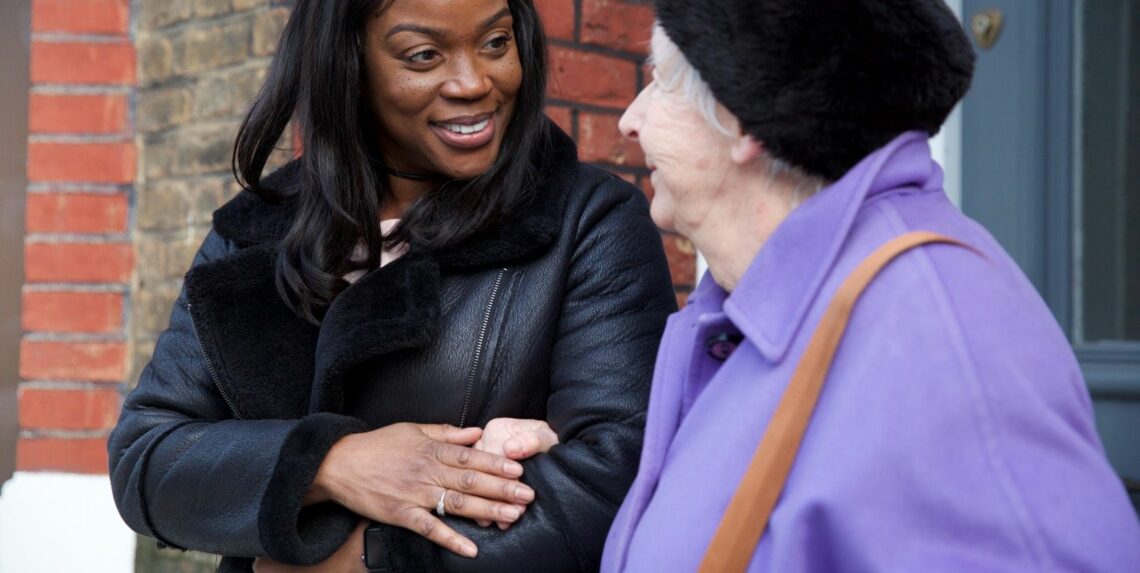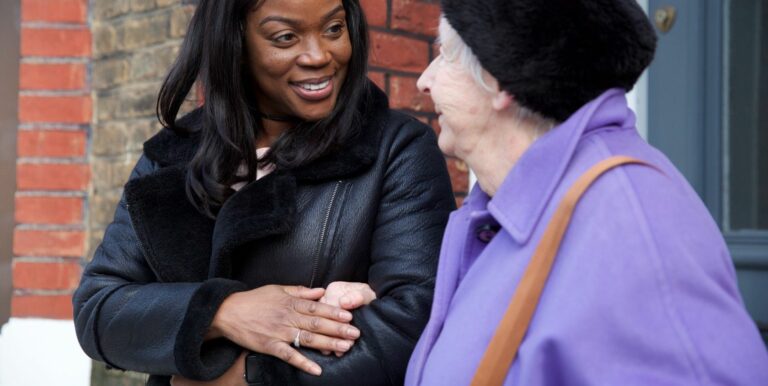Private home care at home
When someone you love needs support at home, choosing the right care matters. Hometouch provides private home care designed around medical needs and personal routines. Speak to one of our care advisors today.

Why families choose private home care
- Care delivered at home, not in an institution
- Clinically reviewed care plans, overseen by healthcare professionals
- Carefully matched carers who understand both health needs and personality
- Flexible support — from short visits to 24-hour live-in care
- Continuity, dignity, and independence in familiar surroundings
What private home care includes
Private home care provides professional support in your own home, tailored to the level of help required.
Support may include:
- Personal care (washing, dressing, continence support)
- Medication prompting and routine monitoring
- Meal preparation and nutrition support
- Mobility assistance and fall prevention
- Companionship and reassurance
- Overnight or live-in care where needed
Care can be arranged for a few hours a week, daily visits, or full-time live-in care, depending on your situation.
Is private home care right for your family?
Private home care is often suitable if:
- A loved one wants to remain at home but needs extra support
- You’re noticing changes in safety, memory, or daily routines
- Hospital discharge or illness recovery requires supervision
- Dementia or cognitive decline is affecting independence
- Family carers need respite or overnight help
It may not be the right choice if round-the-clock nursing or complex medical interventions are required. In those cases, we’ll help you explore alternatives.
Private home care vs care homes
Private home care
- Care delivered in familiar surroundings
- One-to-one attention
- Flexible routines built around the individual
- Often delays or avoids residential care
Care homes
- Shared environment and staff
- Fixed routines
- Less personalised attention
- Requires relocation from home
Many families choose home care to maintain independence, comfort, and continuity.
Our private home care options
Managed home care
A fully managed service where we handle assessments, carer employment, training, supervision and ongoing review. This is suitable for families who want clinical teams to manage everything.
Introductory home care
We introduce you to carefully vetted, self-employed carers, while still providing guidance and clinical oversight. This offers flexibility with professional reassurance.
Live-in home care
A dedicated carer lives in the home, providing continuous support and companionship – a popular alternative to residential care.
Discuss the right option with a care adviser
“Hometouch were very helpful, right from the first phone enquiry. I could not have had a better person looking after my Dad, she was full of kindness and friendship and willing to do anything to help and improve his quality of life. Keeping him at home was so important. I would recommend Hometouch as it is a big decision to get a live-in carer.” – Heather Wexham
How care works day-to-day
- Initial conversation with a care adviser
- Clinical assessment to understand health and lifestyle needs
- Carer matching based on experience and personality
- Ongoing oversight with regular reviews and family updates
How much does private home care cost?
Costs depend on:
- Level of care required
- Frequency and duration of visits
- Whether care is visiting or live-in
- Location and carer experience
We provide clear pricing and help families explore funding options, including local authority support or NHS Continuing Healthcare where applicable.
Take the next step
Choosing care is a significant decision. A short conversation can help clarify your options and next steps.
Looking for live-in care in your county?
a
- Live-in care in Aberdeen
- Live-in care in Aberdeenshire
- Live-in care in Angus
- Live-in care in Argyll
- Live-in care in Ayrshire
b
- Live-in care in Banffshire
- Live-in care in Bedfordshire
- Live-in care in Berkshire
- Live-in care in Berwickshire
- Live-in care in Bristol
- Live-in care in Buckinghamshire
- Live-in care in Buteshire
c
- Live-in care in Caithness
- Live-in care in Cambridgeshire
- Live-in care in Cheshire
- Live-in care in Clackmannanshire
- Live-in care in Clwyd
- Live-in care in Cornwall
- Live-in care in Antrim
- Live-in care in Armagh
- Live-in care in Down
- Live-in care in Durham
- Live-in care in Fermanagh
- Live-in care in Londonderry
- Live-in care in Tyrone
- Live-in care in Cumbria
d
- Live-in care in Derbyshire
- Live-in care in Devon
- Live-in care in Dorset
- Live-in care in Dumfries and Galloway
- Live-in care in Dumfriesshire
- Live-in care in Dunbartonshire
- Live-in care in Dundee
- Live-in care in Dyfed
e
- Live-in care in East Ayrshire
- Live-in care in East Dunbartonshire
- Live-in care in East Lothian
- Live-in care in East Renfrewshire
- Live-in care in East Riding
- Live-in care in East Sussex
- Live-in care in Edinburgh
- Live-in care in Essex
f
g
- Live-in care in Glasgow
- Live-in care in Gloucestershire
- Live-in care in Greater Manchester
- Live-in care in Guernsey
- Live-in care in Gwent
- Live-in care in Gwynedd
h
- Live-in care in Hampshire
- Live-in care in Herefordshire
- Live-in care in Hertfordshire
- Live-in care in Highland
i
- Live-in care in Inverclyde
- Live-in care in Inverness-shire
- Live-in care in Isle of Man
- Live-in care in Isle of Wight
k
- Live-in care in Kent
- Live-in care in Kincardineshire
- Live-in care in Kinross-shire
- Live-in care in Kirkcudbrightshire
l
- Live-in care in Lanarkshire
- Live-in care in Lancashire
- Live-in care in Leicestershire
- Live-in care in Lincolnshire
- Live-in care in London
m
- Live-in care in Merseyside
- Live-in care in Mid Glamorgan
- Live-in care in Midlothian
- Live-in care in Moray
n
- Live-in care in Nairnshire
- Live-in care in Norfolk
- Live-in care in North Ayrshire
- Live-in care in North Lanarkshire
- Live-in care in North Yorkshire
- Live-in care in Northamptonshire
- Live-in care in Northumberland
- Live-in care in Nottinghamshire
o
p
- Live-in care in Peebleshire
- Live-in care in Perth and Kinross
- Live-in care in Perthshire
- Live-in care in Powys
r
- Live-in care in Renfrewshire
- Live-in care in Ross and Cromarty
- Live-in care in Roxburghshire
- Live-in care in Rutland
s
- Live-in care in Scottish Borders
- Live-in care in Selkirkshire
- Live-in care in Shetland
- Live-in care in Shropshire
- Live-in care in Somerset
- Live-in care in South Ayrshire
- Live-in care in South Glamorgan
- Live-in care in South Lanarkshire
- Live-in care in South Yorkshire
- Live-in care in Staffordshire
- Live-in care in Stirling
- Live-in care in Stirlingshire
- Live-in care in Suffolk
- Live-in care in Surrey
- Live-in care in Sutherland
t
w
